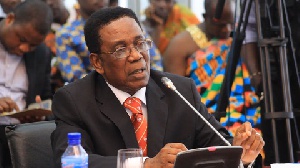Professor Kwesi Yankah, the Minister of State in-Charge of Tertiary Education, has described as unfair the perception of the western countries that the academic standards of higher education in Africa are low.
He said this suspicion weakened the competitiveness of Africa’s higher educational institutions internally and externally.
Prof Yankah was speaking at the ongoing conference for the Joint Committees on Education, Science and Technology, and the Committee on Information Technology of the ECOWAS Parliament in Accra.
The five-day conference is on the theme: “The Status of Harmonisation of Educational Systems and Curricular in West Africa: With Special Reference on Equivalence of Degrees, Diploma, Certificates and other qualifications.”
Prof Yankah said a recent Webomatrix publication about the rating of world universities showed that no African university fell within the best 300 universities in the world.
He said even the top five universities in Africa fell in the best 1000 universities of the world, with all of them being in South Africa.
He explained that the highest ranked university in Africa placed 317th and the one which ranked 100th in Africa, ranked 11,591st in the world.
Prof Yankah also indicated that the geographical distribution of universities in the top, middle, and bottom brackets showed a considerable inequality between universities in Africa and the rest of the world.
He said within Africa itself there was a sharp divide in perceived standards between universities in South Africa and Northern Africa on one hand, and those in typical sub-Saharan Africa, adding that the latter are poorly perceived and placed in terms of infrastructure, human resources, and academic output.
He said the perception of low academic standards in Africa slowed down academic migration from South to North, and put African scholars and students under unnecessary suspicion when credentials were presented elsewhere.
“It largely takes the intervention of credible accreditation boards on the continent, explaining degree and grade equivalences across borders, to reassure universities elsewhere of the validity of grades and degrees from Africa” he said.
Prof Yankah said there was the need to harmonise the educational standards in the sub-region to ensure transparency in curriculum development including teaching and learning, the duration of courses, credit accumulation and recognition of experiential learning.
He, however, noted that the foremost challenges facing higher education in West Africa include gender and cultural disparities, the mismatch between skills and industry requirements, diverse admission criteria, poor recognition of African qualifications externally and the absence of credit transfer arrangements (locally, regionally and internationally).
Mr Anthony Kofitse, an Executive Director at WAEC, giving an overview of the “Experience of Anglophone Countries on Harmonisation in School Curricular” said WAEC was established in 1952 to contribute to education in Anglophone countries in West Africa including Ghana, Nigeria, Sierra Leone, Liberia, and the Gambia.
He said the Council, to a large extent, had been to harmonise the educational standards of member states and that a good WAEC results from any of the Anglophone countries could allow a person to gain admission into a university in those countries.
He said some of the challenges coming out of the new reforms undertaken by the Council were that each member country now created its own curricular and called on the institutions to add the continuous assessment to a candidate’s total score to grade him.
General News of Friday, 11 August 2017
Source: GNA
Description of African education as low in academics unfair – Prof Yankah
Entertainment












